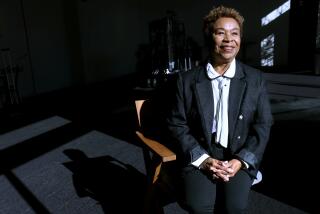Betty Warner Sheinbaum, an independent woman with a Hollywood pedigree, dies at 97
She was an artist whose favorite president was FDR. She devoured books and newspapers and hosted events where people could discuss social causes and politics and raise money for their efforts. She hunted for the Ho Chi Minh trail and collected modern art. And she knew how to wield a blowtorch.
Betty Warner Sheinbaum, who died Sunday at 97 after a brief illness, was also part of the Warner family — as in Warner Bros. Pictures — but her independence from what could have been a predictable Hollywood-royalty story was, according to two of her children, what set her apart.
She lived her life at what her son called “the junction of art and politics.”
Born in New York in 1920, the girl Harry Warner named Betty May moved with her family to Los Angeles as a tween when her dad, the first president of Warner Bros., came in search of better light for his movie productions. Over the course of her life she would live not only in L.A. but in Santa Barbara, Santa Monica and Beverly Hills, with a brief return to her native New York during her second marriage.
At 19, Betty Warner married Milton Sperling, a producer and screenwriter who was introduced to her by a family member and would become the father of her four children. They would be wed for 25 years before divorcing.
In 1964, she married activist Stanley Sheinbaum, who was described to The Times in 1987 by lobbyist Tony Podesta as “sort of the Statue of Liberty for liberal politics in America. He stands there at the harbor in L.A. and says, ‘Give me your tired, your hungry and your poor, and we’ll see if we can do something with them.’ ”
But Betty was the one who made Stanley a liberal, according to her son, Matthew Sperling. Together, the couple embarked on efforts that included a sojourn to Phnom Penh, Cambodia, during the Vietnam War in search of the Ho Chi Minh trail.
Stanley ran unsuccessfully for Congress twice out of Santa Barbara and was chairman of the American Civil Liberties Union in Southern California, and he and Betty participated in antiwar efforts and supported the civil rights movement, California farmworkers’ struggles and efforts to bring peace to the Middle East.
The couple helped free future Greek Prime Minister Andreas Papandreou when he was held prisoner during a right-wing military coup and were central to Daniel Ellsberg’s defense in the Pentagon Papers case.
“His whole history kind of blended with hers,” daughter Karen Sperling said, though before Stanley entered the picture, Betty was quite active in art and politics on her own. “Stanley just continued to provide [her] with the next adventure in all of this.” Betty was constantly at his side, though she didn’t take credit publicly, Karen said; the two were “partners.”
All the while, Betty Sheinbaum was a prolific painter and sculptor, working first in oils, watercolors and acrylics before expanding into handcrafts and even creating works with parts of old, junked cars (hence the blowtorch). She always took classes, started a handcrafts gallery that would include work from hundreds of artists and had an exhibit of her own work at the Tag Gallery in Santa Monica as recently as last year.
Her political beliefs were reflected in her art, in works such as a series on bullfighting that Matthew Sperling called “more sympathetic toward the bull,” and a series of environmental works made with recycled materials.
Also, she collected modern art, staying ahead of the curve as she bought pieces on the cheap that would grow in value over the years, often to be sold later to fund various social and political causes she was involved with. She had a keen eye — think Jackson Pollock and Robert Motherwell.
“A lot of people buy art to have its value go up and to stick it on the wall and stand back from it. My mom bought because she loved a piece and knew the artist,” Karen Sperling said. In their house, “there would be a Henry Moore on the floor next to a teddy bear…. Nothing was precious because of its expense or beauty. It was to live with. She had a collection to live with. That attitude just made it part of our home.”
At that home there was also activism and with it, social consciousness. Betty and Stanley, who died last September at 96, regularly hosted events for dozens or hundreds of people. Imagine Walter F. Mondale or Sen. Edward M. Kennedy, John Kenneth Galbraith or Abbie Hoffman, speaking and often raising money in an art-filled living room that was a launching pad for any number of campaigns and political causes. Those events were also a place people could just meet and mingle.
The home was always “open to conversation about the arts, music, literature, politics,” Karen Sperling said. “Her whole life was devoted really to encouraging people to speak to each other and to learn what was going on in the world.”
Matthew Sperling said his mother, though modest, was proud to be an American, and she and her second husband gave “significant support” to the presidential campaigns of Eugene McCarthy, George McGovern, John Anderson, Barack Obama and Bernie Sanders, and they hosted former President Clinton at their home when he was governor of Arkansas.
Karen Sperling said her mother was “always worried” about the state of the world, however, and in the months before her passing would simply roll her eyes and say things like, “How did we get here?” and, about the current president, “How did we get him?”
“She was deeply concerned about the direction of the country,” her son said.
Betty Sheinbaum was also proud to be a Warner, he said. “She didn’t distance herself from the family … but she was her own person. It was reflected in her collecting. It was reflected in her art.
“She was an independent woman, and when you’re married to Stan Sheinbaum and to my dad, who at the time was an important producer and screenwriter, and had her father as Harry Warner — to be an independent woman was really an accomplishment.”
Sheinbaum is survived by three of her four children: Karen Sperling, Cass Warner and Matthew Sperling (daughter Desiree Sperling, born Susan Sperling, died in 2006). She also leaves eight grandchildren and 13 great-grandchildren.
More to Read
The biggest entertainment stories
Get our big stories about Hollywood, film, television, music, arts, culture and more right in your inbox as soon as they publish.
You may occasionally receive promotional content from the Los Angeles Times.







